I choose eco-friendly, cruelty-free colors because they align with my values of sustainability and kindness. These products often use natural pigments and plant-based dyes, ensuring vibrant shades without harmful chemicals. I love knowing that my choices support animal rights by eliminating testing practices that harm animals. Plus, these options promote a healthier planet through responsible sourcing and ethical production. When I buy eco-friendly colors, I'm making a positive impact on both the environment and my well-being. If you're curious about the myriad benefits and options available, there's so much more to explore.
Key Takeaways
- Eco-friendly cruelty-free colors use natural pigments, promoting a healthier planet and reducing reliance on harmful synthetic chemicals.
- Choosing cruelty-free products supports animal rights and eliminates testing on animals, contributing to ethical consumerism.
- Sustainable sourcing of ingredients minimizes environmental impact and supports responsible production practices, benefiting both communities and ecosystems.
- Transparent labeling and ethical practices foster consumer trust and loyalty, aligning with the values of environmentally conscious consumers.
- Increased awareness of climate change and animal welfare drives demand for eco-friendly cruelty-free colors, promoting a more compassionate marketplace.
Understanding Eco-Friendly Colors
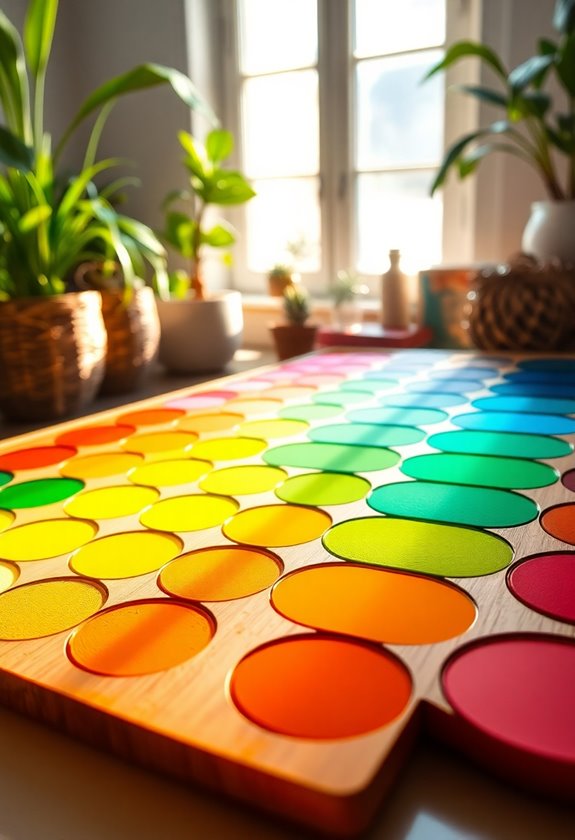
When it comes to choosing colors that are both eco-friendly and cruelty-free, I often find myself diving into the details of what makes these products sustainable. I've discovered that natural pigments and plant-based dyes are key components in creating vibrant colors without harming the environment or animals. These alternatives not only reduce the reliance on synthetic chemicals but also promote a healthier planet. I love exploring how different plants, fruits, and minerals can yield a palette of stunning hues. By opting for products that prioritize these ingredients, I feel like I'm making a responsible choice. Ultimately, understanding the sources of these colors allows me to embrace a more sustainable lifestyle while still enjoying the beauty of color in my life.
Benefits of Cruelty-Free Products
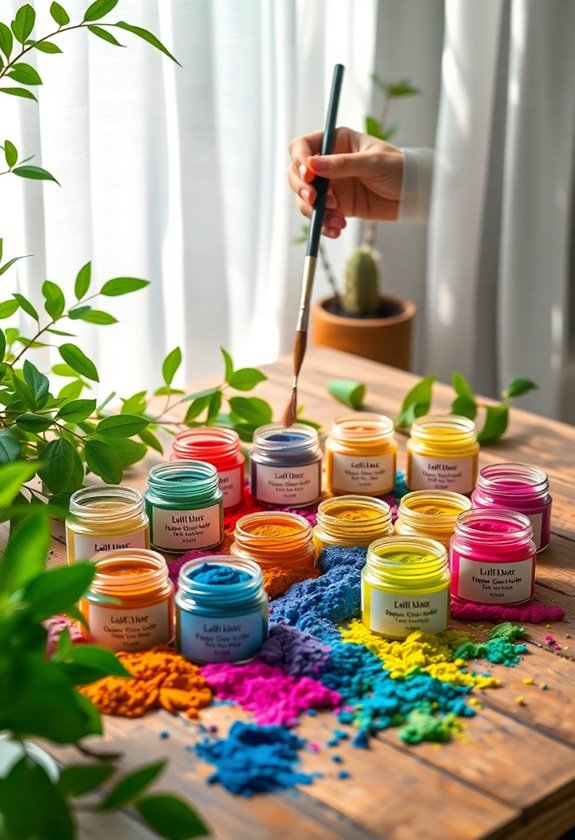
Why should we consider cruelty-free products in our daily lives? For me, choosing cruelty-free products isn't just a trend; it's a commitment to ethical consumerism. When I opt for brands that prioritize animal rights, I feel a sense of empowerment, knowing my choices contribute to a more compassionate world. These products often use natural ingredients, which can be better for our health and the environment. Plus, supporting cruelty-free brands encourages companies to adopt more humane practices. I love that every time I purchase cruelty-free items, I'm voting with my wallet for a future where animals are treated with respect. It's a small change that can lead to significant impacts, both for animals and the planet.
The Impact on Animal Welfare
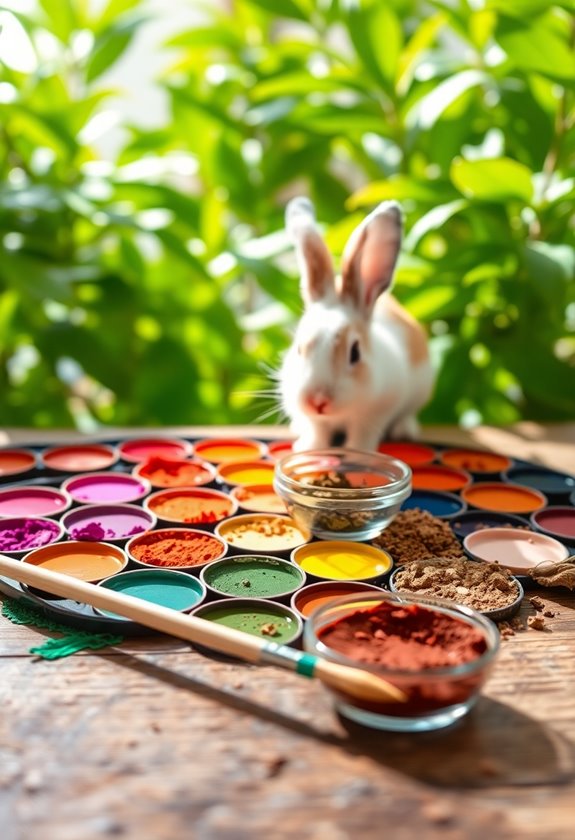
Choosing cruelty-free products has a direct and profound impact on animal welfare. When I opt for brands that avoid animal testing, I support ethical considerations that prioritize humane alternatives. This choice not only aligns with my values but also sets a precedent for industry standards. Increased consumer awareness about the consequences of animal testing can drive change, influencing regulatory impact and encouraging companies to adopt cruelty-free certifications.
As I advocate for animal rights through my purchasing decisions, I contribute to shifting public perception. More people are recognizing the importance of supporting cruelty-free brands, which amplifies advocacy efforts. Together, we can create a marketplace where compassion for animals is the norm, leading to a future where cruelty-free practices are standard across industries.
Sustainable Sourcing Practices
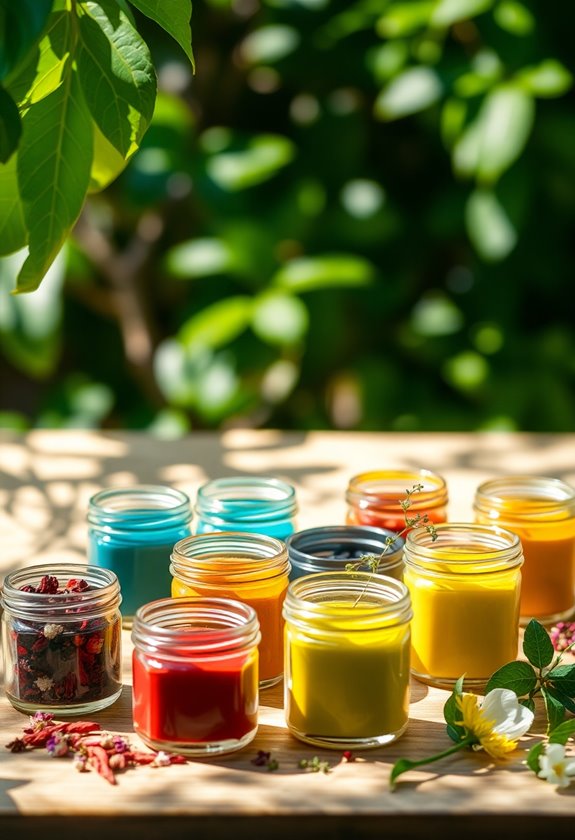
Sustainably sourcing ingredients is essential for creating eco-friendly, cruelty-free colors. I believe that using sustainable materials not only helps protect our planet but also supports ethical production practices. When I choose brands that prioritize these values, I feel good knowing that the ingredients are responsibly harvested, often from renewable sources. This commitment means fewer harmful chemicals and less environmental impact, allowing us to enjoy vibrant colors without guilt. Furthermore, supporting companies that engage in ethical production guarantees fair treatment for workers and communities involved in the supply chain. By making conscious choices about the products I use, I contribute to a healthier planet and a more sustainable future, all while enjoying the beauty of cruelty-free colors.
Healthier Choices for Consumers
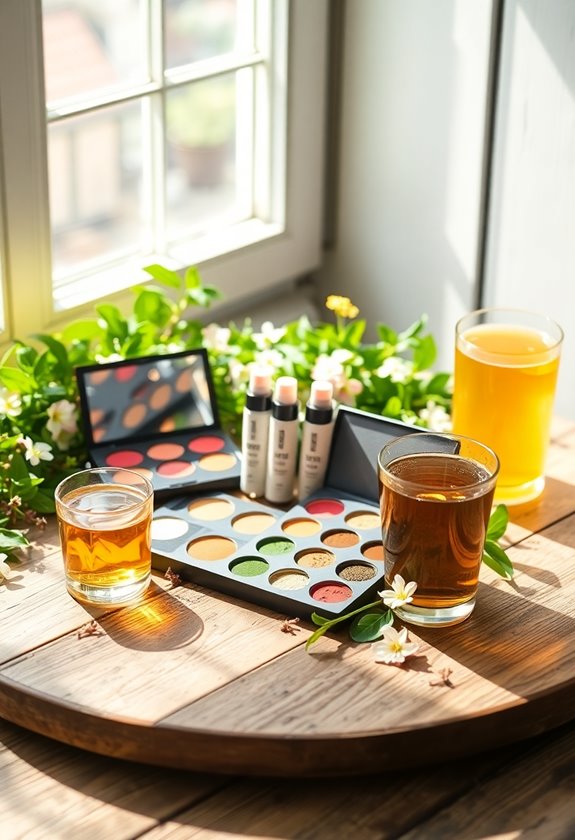
Empowerment comes from making healthier choices as consumers, especially when it comes to beauty products. By opting for eco-friendly cruelty-free colors, I'm not just choosing beauty; I'm choosing my health and the well-being of our planet. It's all about being aware of what I put on my skin and supporting brands that prioritize transparency. Here are some key benefits of using natural pigments:
- Reduced risk of skin irritation
- Fewer harmful chemicals
- Support for sustainable practices
- Increased consumer awareness about ingredients
When I choose products made with natural pigments, I feel good knowing I'm making a positive impact. Every small decision counts, and together we can create a healthier future for ourselves and generations to come.
Environmental Benefits of Eco-Friendly Colors
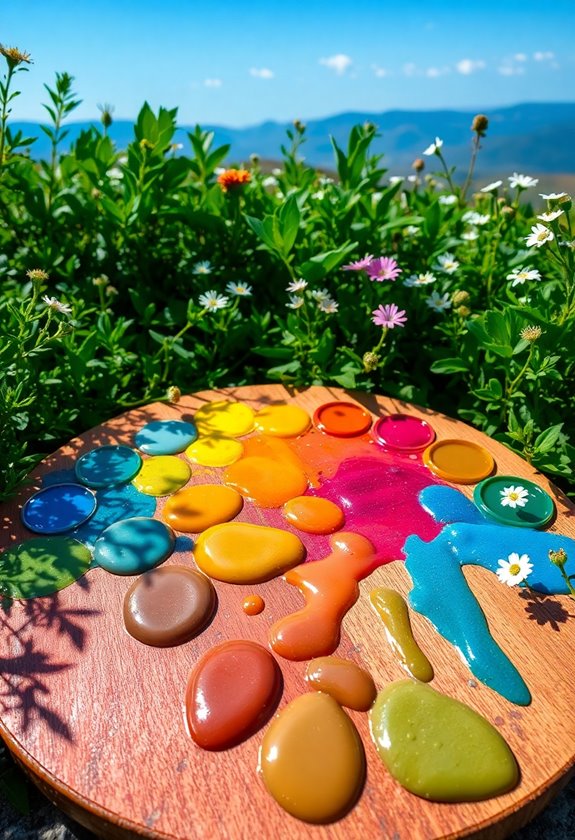
The vibrant hues of eco-friendly colors not only enhance beauty but also contribute to a healthier planet. By opting for products made with natural pigments, I'm supporting sustainable practices that minimize environmental impact. These pigments, derived from plants and minerals, reduce the need for harmful synthetic dyes that can pollute our water systems.
Additionally, eco-friendly colors often emphasize waste reduction, as many brands focus on sustainable packaging and production processes. Choosing these products means I'm playing a part in decreasing landfill waste and promoting recycling. Every time I select eco-friendly colors, I'm not just making a style choice; I'm actively participating in a movement towards a cleaner, greener world. It feels great to know my choices make a difference!
Popular Eco-Friendly Color Brands

When it comes to choosing eco-friendly colors, several standout brands have captured my attention for their commitment to sustainability and quality. These brands prioritize natural pigments and plant-based dyes, making them a fantastic choice for anyone looking to minimize their environmental impact. Here are a few of my favorites:
- Earth Safe Finishes: Known for their non-toxic, plant-based formulations.
- Eco Paints: Offers a wide range of colors using natural pigments.
- Auro: Specializes in eco-friendly paints made from renewable resources.
- Green Planet Paints: Focuses on safe, biodegradable options.
How to Identify Cruelty-Free Products
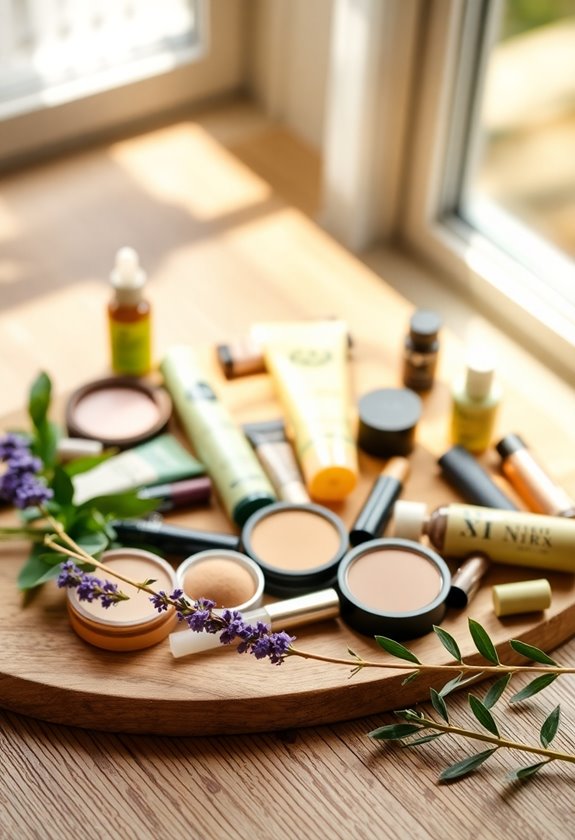
Steering through the world of cruelty-free products can feel overwhelming, but knowing what to look for makes it easier. First, I always check for cruelty-free certifications from reputable organizations like Leaping Bunny or PETA. These labels provide assurance that the brand hasn't tested on animals at any stage of production. Next, I pay attention to ingredient transparency; companies that openly list their ingredients are often more trustworthy. If I see vague terms or hidden ingredients, I get suspicious. Additionally, I research brands to see if they have ethical practices and a commitment to animal welfare. By keeping these factors in mind, I can confidently choose products that align with my values while supporting a cruelty-free lifestyle.
DIY Eco-Friendly Color Options
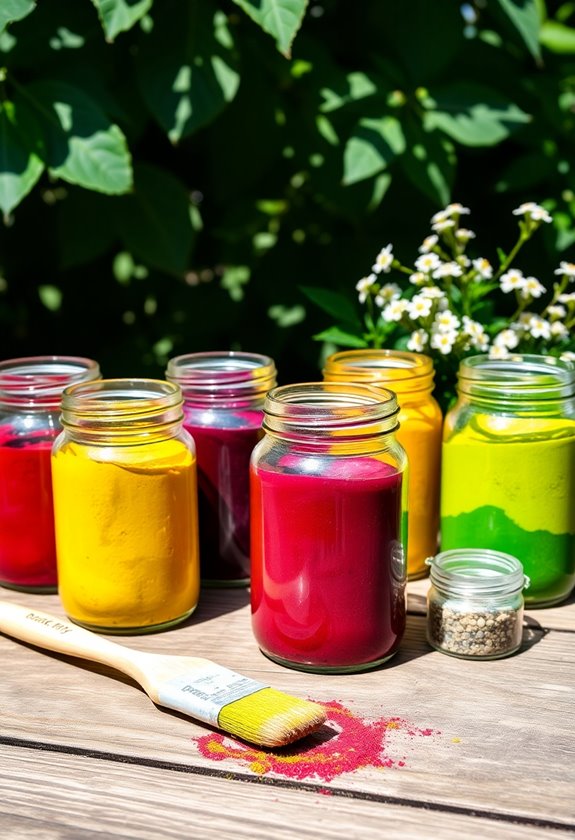
Creating your own eco-friendly colors is both fun and rewarding. I love experimenting with natural dye techniques using plant-based pigments, and it's amazing to see how vibrant and unique each color can be. Here are some simple options to get you started:
- Avocado pits and skins for soft pinks
- Turmeric for bright yellows
- Red cabbage for stunning blues and purples
- Onion skins for warm, earthy tones
Each of these ingredients offers a chance to explore color while being kind to the planet. Plus, you'll enjoy the satisfaction of creating shades that are truly your own, all without harmful chemicals. So, why not plunge into it and start mixing? You might discover your new favorite hue!
The Future of Sustainable Beauty
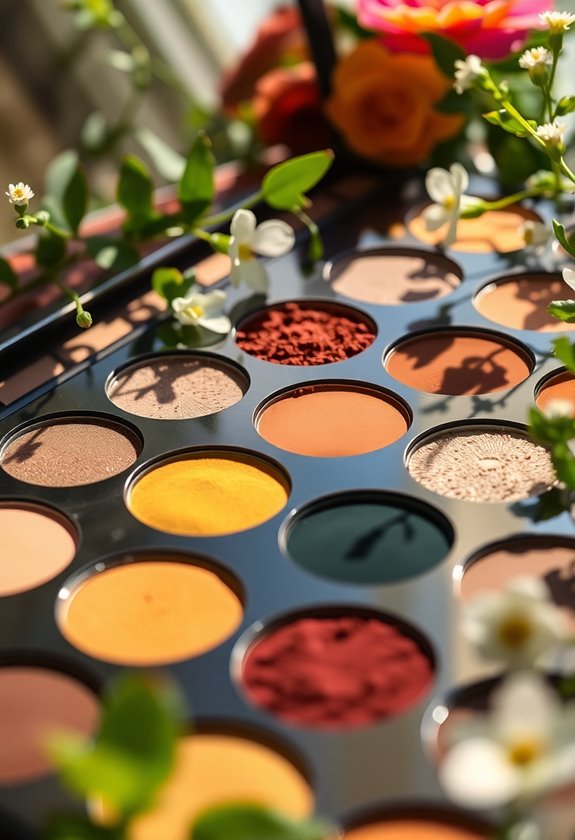
As I explore the world of natural dyes, I'm excited to see a broader movement toward sustainable beauty emerging. Consumers are becoming more aware of their choices, pushing brands to embrace sustainable innovations and ethical branding. It's inspiring to witness companies shifting toward responsible sourcing and eco-friendly practices.
| Key Aspects | Impact on Beauty Industry |
|---|---|
| Sustainable Innovations | Reduce environmental footprint |
| Ethical Branding | Build consumer trust |
| Transparency | Foster brand loyalty |
This shift not only promotes healthier products but also encourages a community focused on preserving our planet. I believe this is just the beginning, and together we can champion a beauty industry that prioritizes sustainability and ethics.
Frequently Asked Questions
What Are Some Common Ingredients in Eco-Friendly Colors?
When I plunge into eco-friendly colors, I find magical natural pigments and sustainable sourcing everywhere! They're like treasures from nature, transforming my projects while keeping the planet happy and healthy. It's a win-win, don't you think?
How Can I Properly Dispose of Eco-Friendly Color Products?
I always check local disposal guidelines for eco-friendly color products. Many can be recycled using specific recycling methods. If unsure, I ask my local waste management for advice to guarantee I'm disposing of them correctly.
Are Eco-Friendly Colors More Expensive Than Traditional Options?
When I compare the vibrant hues of eco-friendly colors to traditional options, I see a bright future. While prices can vary, market trends show that these sustainable choices often balance out in the long run.
Can Eco-Friendly Colors Achieve the Same Vibrancy as Conventional Colors?
Can eco-friendly colors achieve the same vibrancy as conventional colors? Absolutely! I've found that natural pigments offer stunning hues and impressive color longevity, proving that sustainability doesn't mean sacrificing beauty in my projects.
Where Can I Find More Information on Eco-Friendly Color Certifications?
I've found great information on eco-friendly color certifications through certification organizations like Green Seal. Checking color product labels also helps me identify sustainable options. It's crucial to research and support brands committed to eco-friendly practices.
